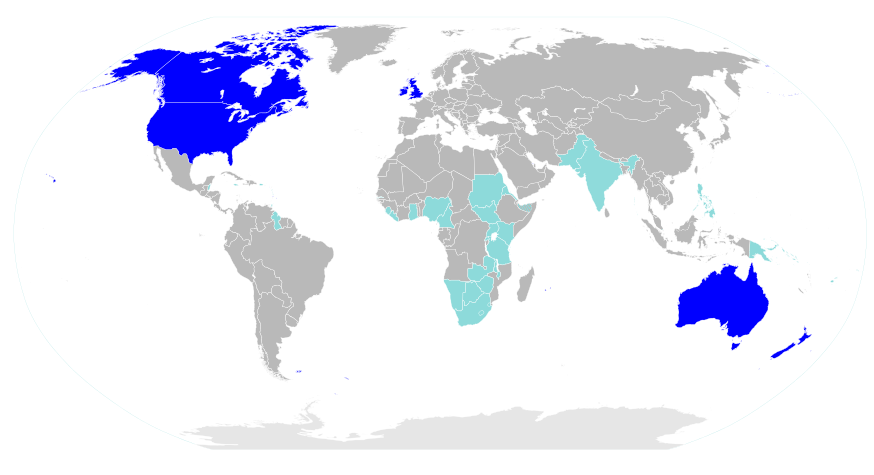
In this unit, we’ll explore how English varies across Anglo cultures like the U.S., U.K., and Australia. Even though they all speak English, each place has its own unique twist on accents, slang, spelling, and culture.
Understanding these differences will not only make you a better communicator but also help you connect with people across the globe. There’s a vast world out there worth exploring!
CULTURAL NUANCES OF THE ANGLOSPHERE
The Anglosphere refers to a group of English-speaking countries that share a common cultural heritage, language, legal systems, and historical ties, often originating from their shared British colonial history.

In the following presentation, discover key cultural nuances within the Anglosphere, specifically focusing on Australia, the US, and the UK.
On top of the aforementioned cultural nuances, there are some other quirky and funny things from the UK, US, and Australia that people might find amusing.
Learning Activities
Cultural Role-Play
Divide yourself into groups. You will be provided with role-play scenarios where you must interact according to the cultural norms of the UK, US, or Australia.
Examples of scenarios: a day out in London, a 4th of July American celebration, or an Australian social BBQ.
The rest of the class has to guess the culture that was being depicted. Afterward, we’ll discuss how each culture’s communication style and etiquette influenced each role play that was presented.
Cultural Comparison
Write a short booklet comparing your own culture with those of the UK, US, and Australia, tailored for Ecuadorian tourists traveling to these destinations. Each section should focus on a specific aspect, such as social interactions, work and leisure attitudes, or humor. Be sure to provide guidance on how they might need to adapt while being in each country, considering the cultural differences they may encounter.
DIFFERENCES BETWEEN BRITISH AND AMERICAN ACCENTS AND PRONUNCIATIONS
British and American accents, though rooted in the same language, differ significantly in pronunciation, vowel sounds, and stress patterns. Recognizing these variations will enhance listening comprehension and effective communication in different English-speaking contexts.
In the following video, there are some practical examples of how pronunciations differ between the US and the UK:
The Main Differences in Speech Between UK and US English
- The most obvious difference is the way the letter r is pronounced. In British English, when r comes after a vowel in the same syllable (as in car, hard, or market), it is often softer or even silent, so “car” might sound like “cah” and “hard” like “hahd.” In American English, the r is pronounced clearly. This is known as “rhotic” pronunciation.
- Another notable difference is in how the letter t is pronounced. Americans often pronounce the “t” in the middle of words like “water” or “better” more like a soft “d” (called a “flap”). So, “water” sounds like “wadder” and “better” like “bedder.” On the other hand, in British English, the “t” is usually pronounced more clearly, so “water” and “better” are enunciated with a sharp “t” sound.
- Another difference between British and American English is intonation. American speakers often use a flatter, more monotonous tone, while British speakers tend to vary their tone more, moving from high to low.
There are other differences in pronunciation, including some vowel sounds and syllable stress in certain words. But instead of going through a long list, it’s way better to train your ear and get used to the different sounds. Check out the video below to practice!
As you saw in the video, some words are not only pronounced differently but also spelled differently. You’ll explore this further in the next lesson: “Spelling and Vocabulary Variations.”
In the meantime, you can appreciate more differences in pronunciation in these resources:
Video: Quick UK vs US pronunciation comparison
Video: Do you speak British English or American English?
Learning Activities
Accent Match-Up
You will listen to short audio clips or watch videos of people speaking in different English accents. Match each accent to the correct country. You can work individually or in groups.
Accent Imitation Challenge
You will be divided into small groups. Each group member will take turns receiving a phrase commonly used in the US, the UK, or Australia. The student will then read the phrase, trying to imitate the accent of that country. The other group members will guess which accent is being mimicked. Krugs will be awarded for the most accurate imitations.
VOCABULARY AND SPELLING VARIATIONS
Understanding the differences in vocabulary and spelling between the US and the UK is important for several key reasons. Here are a few:
- Professional Edge: In a globalized world, being aware of these variations can give you a professional advantage. It shows that you’re detail-oriented and culturally savvy.
- Enhancing Your Language Skills: Mastering these differences can make you more flexible and confident in your English skills, allowing you to switch seamlessly between American and British English depending on the situation.
- Avoiding Confusion: Some common words in the US might have a completely different meaning in the UK, and vice versa. Learning these differences can help you avoid misunderstandings, whether you’re reading, writing, or having a conversation.
Vocabulary Variations
In the following video, explore some vocabulary differences between American and British English and see how these variations can lead to confusion if you’re not familiar with them.
/
Here is a table with some other variations in the English vocabulary:
| American English | British English |
| apartment | flat |
| attorney | barrister/solicitor |
| candy | sweets |
| college | university |
| cookie | biscuit |
| eggplant | aubergine |
| elevator | lift |
| gas | petrol |
| hood | bonnet |
| parking lot | car park |
| soccer | football |
| truck | lorry |
| trunk | boot |
The vocabulary you’re most familiar with is likely the one you’ve been most exposed to. To broaden your English vocabulary, try reading, watching, and listening to material in different varieties of English.
More resources
Video: UK vs US vocabulary differences conversation
Video: Is your vocabulary American or British?
Spelling Variations
Aside from the pronunciation and vocabulary variations we’ve gone through, British English and American English have different spelling conventions as well. Find out more in the following presentation:
More Resources
Article: The differences in British and American Spelling
Video: American English vs British English spelling
Learning Activities
Scavenger Hunt
The class will be divided into groups. All the groups will receive the same list of American and British vocabulary items that you must find around the school and take a picture of (e.g., “find someone with a red jumper”). The first team to complete the list wins Krugs for each member, and the class can discuss the items found.
Story Swap
You will write a short story or a dialogue in either American or British English. After writing, swap your story with a partner who must rewrite the story in the other variant of English.
Finally, everyone will share the stories with the class and discuss whether the vocabulary changes affected the tone or clarity of the story.
